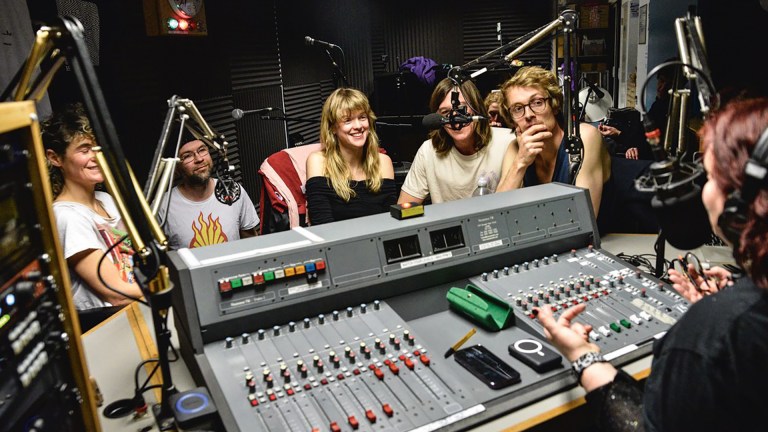The film Guess Who’s Coming To Dinner is a classic. I’ve written a trilogy of Hollywood Plays [Bette and Joan and Baby Jane, Rock and Doris, and Mrs Robinson, I Presume] and this film had so many political and emotional aspects surrounding it that made it very special so I asked BBC Radio 4 if they’d like a fourth.
Old Hollywood is a place of such myth and legend – how did you find the truth of the story?
Research, research, research. With all my plays, but especially this one, I do months of research before I even put pen to paper. I take the myth and then peel back the layers in all aspects.
What did you learn about the socio-cultural / political backdrop to Guess Who’s Coming To Dinner?
This fascinated me! Sidney Poitier, a black man, in 1967 was the highest paid box office star in Hollywood. He had crossed every boundary to become an international god. American film goers loved him. And yet interracial marriage was illegal in 16 states. The Lovings vs The State of Virginia trial was taking place to decide if it was criminal for the Lovings to be married as an interracial man and wife.
And the Civil Rights Movement was dominating the news headlines across America with race riots forcing the nation to sit up and take notice. Against this backdrop Stanley Kramer made this sweet romantic comedy that packed a powerful, powerful punch.
Why is the film so important?
Advertising helps fund Big Issue’s mission to end poverty
Younger woman returns from holiday with older fiancée in tow to the concern of her staid parents – this was a romcom staple. But to have a young pretty woman return from holiday with a tall handsome doctor in tow who was also a black man was hugely groundbreaking.
Then Joey’s parents (Spencer Tracy and Katharine Hepburn) – these East Coast liberals who considered themselves absolutely without any prejudices, have to question why they are shocked, worried and ill at ease with her choice. This was a groundbreaking premise.
Similarly, Poitier’s character’s parents are equally horrified he wants to marry this white middle class woman who they see as elitist. It’s an interesting premise for a romcom.
What did you learn about the commitment of the cast and director to making this work?
Humbling. Spencer Tracy was dying. But he was absolutely committed to making this film. He and his long-time lover Katharine Hepburn knew how important it was to get the film out there and change perceptions. No one would insure Tracy so Kate Hepburn and director Stanley Kramer put their fees in escrow to cover the film until Spencer’s last shot, to make sure he was able to do it.
Hepburn was nursing the love of her life whilst making sure he could get to set and know his lines. Meanwhile Poitier, who was an Oscar winner, found it so hard to be on set with his idol Spencer Tracy that his knees would knock together. It was a very hard shoot because of Tracy’s illness. It adds a poignancy to the scenes. Spencer died 17 days after he completed his last scene. Hepburn never saw the film as she said it was too painful.
Advertising helps fund Big Issue’s mission to end poverty
What a cast you have assembled – did making it during lockdown mean more fantastic actors were available, was it the quality of your writing and the chance to play Hollywood greats, or all of the above!?
Every single one of those parts was written with those actors in mind. But I never thought that they would be willing and available. I sent the script to all of them and was delighted that they all wanted to be in it. Kenneth Branagh (Sir Ken!) took time out of his editing and filming schedule to do it. He said he loved the script and Spencer Tracy is his hero so that was wonderfully fortuitous.
The brilliant David Morrissey was filming Britannia but also took time out to play Stanley Kramer. Daisy Ridley replied immediately to create Katherine Houghton and how lucky that Adrian Lester could also find time to play Poitier.
I think the synchronicity of the play being sent out and the murder of George Floyd gave the play even more relevancy. But I was overjoyed that they all liked the script so much. It was incredible. What an incredible cast. And during lockdown we could only have four people in studio at any one time. Daisy recorded some of her scenes with us remotely. It was technically very different but it worked .
Playing Katharine Hepburn, opposite Kenneth Branagh as Spencer Tracy, is taking on the giants of the movies – intimidating or inspiring…?
I’d played Ken’s wife once before in Edmond (by David Mamet) at the National Theatre. But hadn’t worked with him since. He is the greatest! Apart from the talent, he wears his legendary status so lightly and is the least intimidating person in acting.
Advertising helps fund Big Issue’s mission to end poverty
I was a bit worried about my Hepburn voice (I never try to do impressions more capture the essence) but she had a distinctive voice. After the read through Ken said ‘have you been working on Hepburn’s voice for a long time? You’ve absolutely captured her’.
When Sir Ken tells you that it’s ok. The rest of the record was bliss.
Could the cast reassemble to make a movie version in 2021, please?
Yes please. Make it so!
That Dinner of 67, written by Tracy-Ann Oberman, airs on BBC Radio 4on 31 Dec









